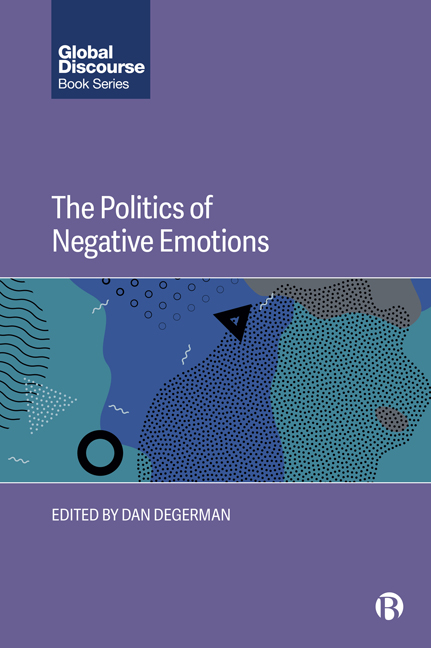Book contents
- Frontmatter
- Contents
- List of Figures
- Notes on Contributors
- Introduction: Feeling Our Way through Politics
- 1 Anger, Fast and Slow: Mediations of Justice and Violence in the Age of Populism
- 2 ‘We Will March Side by Side and Demand a Bigger Table’: Anger as Dignity Claim
- 3 Moving between Frustration and Anger
- 4 The Resentment– Ressentiment Complex: A Critique of Liberal Discourse
- 5 Green Shame: The Next Moral Revolution?
- 6 Against Comfort: Political Implications of Evading Discomfort
- 7 For Love and for Life: Emotional Dynamics at the World Congress of Families
- 8 The Functionality of Affects: Conceptualising Far-Right Populist Politics beyond Negative Emotions
- 9 Moral Economies of Exclusion: Politics of Fear through Antagonistic Anonymity
- 10 Contesting the Politics of Negative Emotions in Educational Policy Making: A Ban on Asylum Seekers’ School Visits in Finland
- Index
10 - Contesting the Politics of Negative Emotions in Educational Policy Making: A Ban on Asylum Seekers’ School Visits in Finland
Published online by Cambridge University Press: 18 January 2024
- Frontmatter
- Contents
- List of Figures
- Notes on Contributors
- Introduction: Feeling Our Way through Politics
- 1 Anger, Fast and Slow: Mediations of Justice and Violence in the Age of Populism
- 2 ‘We Will March Side by Side and Demand a Bigger Table’: Anger as Dignity Claim
- 3 Moving between Frustration and Anger
- 4 The Resentment– Ressentiment Complex: A Critique of Liberal Discourse
- 5 Green Shame: The Next Moral Revolution?
- 6 Against Comfort: Political Implications of Evading Discomfort
- 7 For Love and for Life: Emotional Dynamics at the World Congress of Families
- 8 The Functionality of Affects: Conceptualising Far-Right Populist Politics beyond Negative Emotions
- 9 Moral Economies of Exclusion: Politics of Fear through Antagonistic Anonymity
- 10 Contesting the Politics of Negative Emotions in Educational Policy Making: A Ban on Asylum Seekers’ School Visits in Finland
- Index
Summary
Introduction
Finland is a small northern European nation of only 5.6 million people with a rather homogenous population. It has a relatively strong welfare model, resulting from and intertwined with social and political development in which the comprehensive, state-run education system has played a crucial role. Especially during the last decades of the 20th century, high-quality public schooling for all citizens was effective in levelling out social and economic differences in Finnish society (Sahlberg, 2015). However, in recent years, the political climate in Finland has been strongly influenced by global phenomena such as the immigration crisis and changes in the global economy. As in other European countries, one of the distinctive features of this political change has been the rise of right-wing populism and the emergence of nationalist movements. The parliamentary election in March 2019 demonstrated the force of these movements in Finland, as the leading anti-immigration party, the Finns Party, came very close to winning the election, losing only by one seat to the Social Democratic Party. The political rhetoric of the Finns Party, and anti-immigration parties in general, is often characterised by an appeal to negative emotions, which are typically directed against immigrants and asylum seekers who are perceived as a threat to the prevailing national identity and to the stability of society (for example, Ahmed, 2004; Kinnvall, 2018). Accordingly, a recent survey shows Finland to be one of the more racist countries in Europe when it comes to racial discrimination and harassment speech experienced by people of colour (European Union Agency for Fundamental Rights, 2018).
In this chapter, we analyse a recent case of local policy making in Finland strongly affected by the expression of negative emotions. Our case is situated within the field of education and concerns school visits, which are a common practice in Finnish comprehensive schools. Schools get visitors from all around the world, from academics to politicians and businesses, and they are also places for civil service and social impact work by the third sector. Our case example1 deals with asylum seekers’ visits to local schools and day-care centres in the city of Oulu in Finland, organised by Red Cross Finland and a local non-profit social work organisation.
- Type
- Chapter
- Information
- The Politics of Negative Emotions , pp. 200 - 222Publisher: Bristol University PressPrint publication year: 2023

